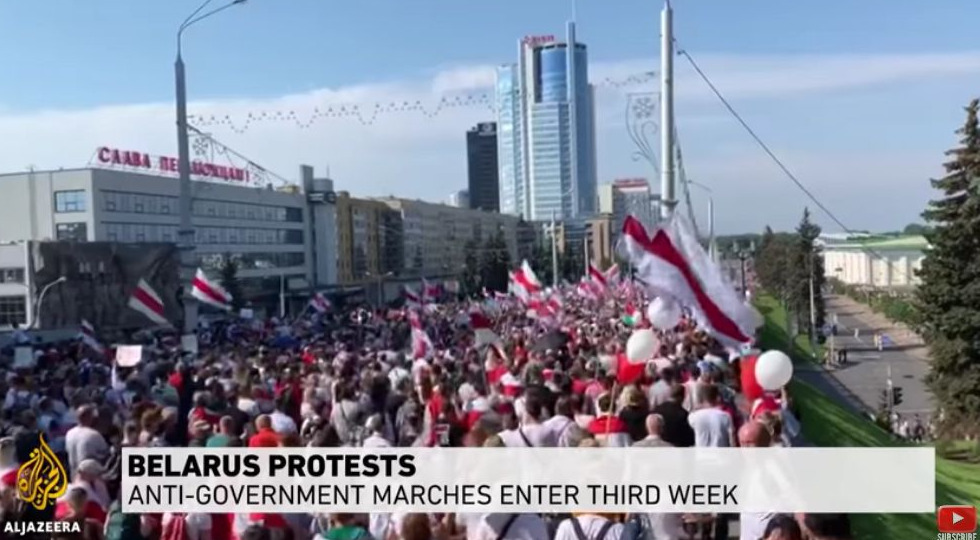
Angry protests after a rigged election in Belarus and the Kremlin’s ouster of an elected governor in Russia’s Far East evoke images of the tumultuous rise against Eastern European dictatorships in 1989.
The sweep of anti-Communist revolution three decades ago never reached Belarus, where President Alexander Lukashenko, a state farm director in the Soviet era, has been in power for 26 years.
In Russia, reforms failed to gain traction after the Soviet Union’s collapse in 1991, and have been subverted by President Vladimir Putin during his 20 years in the Kremlin – where he is likely to stay until 2036 after scuttling constitutional term limits earlier this year.

Both leaders embrace KGB tactics against political opponents — jailing critics, violently repressing demonstrations and, in the case of Putin’s loyal oligarchs and enforcers, murdering or attempting to kill political rivals. Gunmen assassinated prominent opposition figure Boris Nemtsov in a 2015 drive-by shooting in the shadow of the Kremlin, and poison-laced tea was served to Putin’s chief critic Alexei Navalny at a Siberian airport on Aug. 20, an attack he survived after intervention and evacuation by German doctors.
Lukashenko and Putin are both facing serious challenges to their authority, particularly among younger generations with no memory of the systematic and palpable repression of dissent in the Soviet era.
Sadly, those taking to the streets of Minsk and Khabarovsk are getting an education in the desperate measures leaders forged in dictatorship will take to stay in power.
Lukashenko’s claim to have won 80% of the Aug. 9 presidential election triggered immediate cries of massive vote-rigging. The protests were met with an equally swift regime response in deploying police and plainclothes security forces to disperse crowds with tear gas, beat demonstrators and arrest thousands.
On Sunday, the start of a fourth week of daily demonstrations, tens of thousands massed around police barricades preventing their entrance to Minsk’s central Independence Square, where as many as 250,000 have gathered to denounce a stolen election. The protesters chanted “Resign” and demanded a rerun of the vote also condemned as illegitimate by European Union neighbors. The Belarus president, who turned 66 on Sunday, has rejected accusations of vote-rigging, as well as offers by neighboring Baltic state leaders to mediate an end to the unrest disrupting an already teetering economy.
Putin spoke with Lukashenko by phone on Sunday, according to a Kremlin statement that gave few details other than that Putin congratulated his ally on his birthday.
Putin last week offered Lukashenko assistance to restore order amid escalating factory worker strikes and refusal by journalists, even at state-run media, to disseminate falsehoods. Lukashenko, who accuses NATO and the United States of fomenting the uprising against him, claims Putin has agreed to send Russian security troops if he requests them.
But Putin has his own insurrection to deal with in the Far East region of Khabarovsk. Masked federal security police arrested and deposed the elected governor on July 9 and flew him to Moscow to face trial on charges of having ordered killings of several business rivals 15 years ago. Allies of the governor, Sergei Furgal, dismiss the accusations as trumped up to silence a rising political voice against Putin.
The Kremlin has mostly ignored two months of weekly demonstrations in Khabarovsk against Furgal’s ouster, with the expectation that the largest protests in years will peter out with time in the city seven times zones away from Moscow.
While Putin may correctly assume the outrage in Khabarovsk will fade, he cannot ignore the threat that would be posed by a successful exercise in people power if Lukashenko were to fall to the resilient protests on Russia’s doorstep.
The alliance between Minsk and Moscow has been a troubled marriage in recent years, with Belarus straying from its economic and security union with Russia to flirt with Putin nemeses in European Union countries.
Analysts caution against comparing the current anti-government turmoil in Belarus with the successful overthrow of a pro-Kremlin regime in Ukraine in 2014. Putin had much more at stake when Ukrainians angrily rose against President Viktor Yanukovich after he derailed a European Union offer of a path to membership – a westward shift in alliance vehemently opposed by the Kremlin. Three months of fierce protests ultimately drove Yanukovich to seek refuge in Russia. Putin retaliated by seizing and annexing Ukraine’s strategic Crimean Peninsula and sending mercenaries to back Russian separatists still holding two major provinces in eastern Ukraine.
The Belarus opposition is more fractured than the broad Ukrainian movement that deposed Yanukovich. Svetlana Tikhanovskaya, the opposition figure garnering the most votes against Lukashenko, was a substitute candidate after the government jailed her husband. She fled to neighboring Lithuania after the government said she won only 10% of the vote, claiming her life was in danger.
It remains to be seen how Putin would respond if the opposition to Lukashenko gains momentum. Belarus citizens are mostly Russian-speakers and have longstanding cultural, economic and security ties with Russia. Nevertheless, distrust of Lukashenko and disgust with his failure to contain the Covid-19 pandemic or improve living standards are on the rise 29 years after independence.
What is clear is that both Putin and Lukashenko have reached in their moment of challenge for the authoritarian toolbox: Corrupted elections, violent dispersal of demonstrators and retaliation – sometimes lethal — against critics.
“It looks increasingly as if Mr. Putin is running out of tricks, and as if Alexander Lukashenko, his troublesome ally in Minsk, is running out of road,” The Economist wrote in this week’s cover story. “That is why, despite the Kremlin’s denials, they are falling back on the truncheon and the syringe.”
Discover more from Post Alley
Subscribe to get the latest posts sent to your email.
